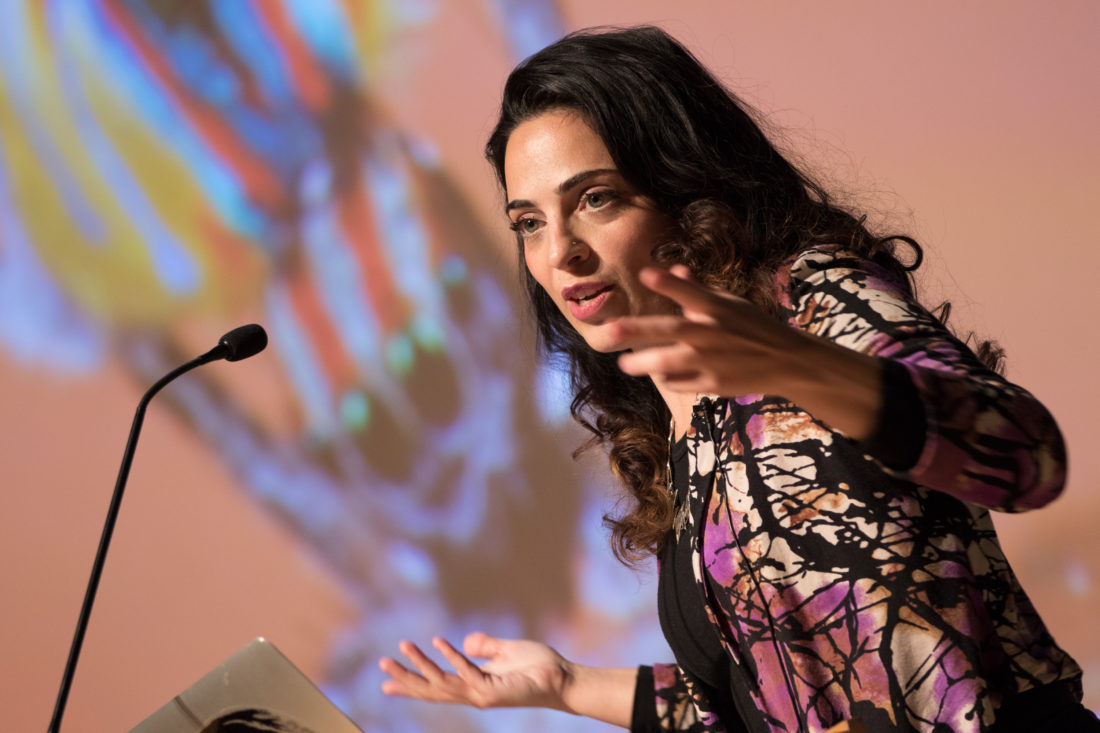
Evolutionary psychologist Dr Diana S. Fleischman delighted an audience of close to 1,000 people in London on Thursday night as part of Humanists UK’s annual celebration of Darwin Day, the anniversary of the birth of Charles Darwin. Diana’s lecture took on a suitably Darwinian theme, exploring the evolution of human morality – as well as its limitations. The lecture was chaired by Humanists UK Vice President, theoretical physicist, and science communicator Professor Jim Al-Khalili.
Diana began with an introduction to her field of evolutionary psychology, explaining simply that evolutionary psychology was an attempt by psychologists to think of the human mind in much the same way as evolutionary biologists think about the human body. From this starting point it’s relatively easy to arrive at what the evolutionary ‘building blocks’ of our evolved morality might be: evolutionarily adaptive and ‘self-interested’ traits like ‘kin selection’ and ‘reciprocal altruism’ were all critical to the survival of our species (as well as other animals). We leverage these same evolved traits today in our complex moral decision-making.
Pivotal to the evolved morality of human beings, Diana said, has been the development of our ‘moral emotions’ – adaptations like anger and disgust (for condemning), gratitude and awe (for praise), empathy and compassion (in response to suffering), as well as more self-conscious and introspective feelings like guilt and shame. Of these, Diana identifies a unique role for disgust: an adaptation we developed in response to the threat of disease, but which we leverage in unique ways in response to a range of ‘moral’ issues.
Disgust, argued Diana, plays a key role in relation to adult humans’ capacity for empathy and how they respond when ‘moral rules’ are transgressed. The role of disgust in a person’s moral thinking varies considerably across the political spectrum, she said, giving the example of a person cleaning their bathroom with a British flag: conservatives and traditionalists are more likely to say this is wrong and disrespectful, while left-leaning liberals are less likely to prize the ‘sanctity’ of a cloth flag so highly. She illustrated her argument further with examples of religious public intellectuals whose writings revere repugnance as evidence in itself of the essential wrongness of certain moral transgressions which cannot otherwise be rationally argued against. ‘Shallow are the souls who have forgotten to shudder,’ read a slide quoting from Leon Kass, a former adviser to George W. Bush and an opponent of assisted dying and stem cell research.
Diana cited this ‘misfiring’ of disgust as a frequent weakness, or a cognitive bias, in our evolved morality. This can be demonstrated in classic ethical dilemmas like ‘the trolley problem’, where people will take rationally less ethical actions to avoid implicating themselves in an act of moral disgust (such as pushing someone onto train tracks in order to avoid a massive rail disaster). Siding with utilitarianism, she argued that ‘we should try to rationally calculate harm’ rather than rely exclusively on the pitfalls of our evolved morality. Other failures of our evolved morality were many, too, such as the ‘problem of scope’: a human’s tendency to better empathise with a single person’s tragedy than a bigger event affecting millions.
Turning to transhumanist themes, she cited the philosophical idea of circles of concern, which has some presence in Darwin’s own writings; Darwin writes of the development of human empathy in tandem with the development of human intelligence, and with it the extension of our moral sympathies beyond our kin and even our species. The question is begged: how can we improve our morality further, and overcome the limitations of our evolved, animal moral impulses which so often misfire? Here Diana offered no easy answers, beyond the practice of mindfulness and attempts at maximising ‘rational good’ like the effective altruism movement. But she warned that the need for human beings to contemplate and better understand our evolved morality, and its limitations, was becoming more and more urgent. In this present moment of time, as human beings look to become creators of advanced artificial intelligences (AIs), we have to understand how we can develop intelligent moral frameworks for these beings that do not lead to unintended consequences.
Notes
The Darwin Day Lecture, held each February as part of Humanists UK’s annual lecture series, explores humanism and humanist thought, especially that related to science and evolution, Charles Darwin, and his works. It takes place every year on or around 12 February, coinciding with Darwin Day, the annual global celebration of the birth of Charles Darwin.
Diana Fleischman’s Darwin Day Lecture is available to watch on the Humanists UK YouTube channel.
Previous Darwin Day Lecturers include Professor Lawrence Krauss, Professor Jerry Coyne, Dr Eugenie Scott, Professor Alice Roberts, Professor Maggie Smith, Professor Sir David King, Dr Adam Rutherford, Sir Tom Blundell, and Dr Susan Blackmore. The Darwin Day Lecture is part of the Humanists UK annual lecture series, which also includes the Rosalind Franklin, Voltaire, Bentham, and Holyoake Lectures. You can find more information about our events programme by visiting our events page.
